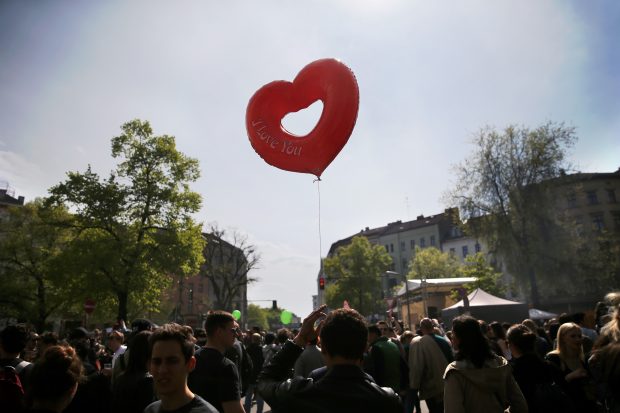When I think about love, that old line by William Goldman about Hollywood comes back to me: Nobody knows anything. It seems that as we grow franker about sex (witness the Naked Attraction TV show, recently described as ‘Blind Date in a brothel’) love reveals less of its mysteries. Just as we’ve all now seen on screen 1001 ways to kill someone and yet know nothing about death, we now know 69 ways to screw someone – once more, often seen on screen for the less adventurous amongst us – and nothing about love. Not even the most basic stuff – how to avoid falling in love with someone we shouldn’t, or how to stay in love with someone we should.
In my opinion, whether we are lucky in love will probably impact more on our chances of finding happiness in life than income, intelligence or success in our chosen careers. I’m aware that this is an unusual thing for a feminist zealot to say, but my long, louche life has convinced me that – for me at least – it’s true. I’m not at all romantic, but I probably spend more time thinking about the subject than most 57-year-old long-married matrons. From a man on a cross to a padded heart on a card, love fascinates me.
I’ve got time for all sorts of love – sexy love, companionate love, fanatical love – but one form of love I’m not keen on is that po-faced buzz-kill ‘unconditional love’. Named in 1934 by the psychoanalyst Erich Fromm, the concept had it that while a father’s love was always conditional, a mother’s was without reason or limits – masochism, sacrifice and self-immolation obviously being second nature to us ladies. In the 1960s, psychologist Carl Rogers proclaimed that therapists should offer their patients ‘unconditional positive regard’, presumably to make the nutters feel better about themselves, which begs the question why they needed a shrink in the first place. Then came the pop songs – everyone from Tupac to Stevie Nicks (‘Unconditional love/I’ll be there when you fall/The one condition of love/Is there are none at all’) to Donna Summer (‘Give me your unconditional love/The kind of love I deserve/The kind I want to return’) to Katy Perry offered up unconditional love. Which is somewhat risible, given that pop stars have traditionally tended to swap sex partners the way my young friends swaps Pokemon cards.
At best, unconditional love is a blank cheque for bores; at worst, it gives those who are inclined to behave abusively an absolute open season. If your idea of the best ride in the plush and teeming pleasure park of love is the bumper cars – hold still while I bash into you! – and if you can watch ‘Oliver!’ without covering your eyes at the treatment Bill Sikes dishes out to both Nancy and Bullseye, then unconditional love may well be for you. And you will find many a support group in the women’s refuges and graveyards of this land.
The only unconditional love I’ve ever given was to my beloved son Jack, who killed himself last year after many years of struggling with mental health problems – which my unconditional love, I believe, made worse. Every threat he threw at blameless mates of mine, every wodge of cash he conned out of me, every time he refused to take sensible advice to do something with his brilliant brain rather than get wasted, I’d be there with the unconditional love, telling him he was perfect just as he was. My friends, who were used to me being a sparky and self-willed individual, were variously amazed and amused by the way I acted around him – one described me as ‘a cross between a geisha and an ATM.’ Eventually, when I began to fear for my own sanity (my doctor, when I went to her for anti-depressants, told me that a large number of those who care for the mentally ill become mentally ill themselves), I made him move out and cut contact with him while continuing to pay his rent. A year after I last saw him, he hung himself.
If only I’d tried the opposite of unconditional love – that Tough Love thing you hear so much about – from the start, the story might have had a happier ending. But I just wasn’t tough enough back then – I loved him too much, and literally couldn’t say no to him. But experience makes us bolder and colder and now I can see unconditional love as the dangerous delusion it is. As my friend Bharat put it: ‘If love is about mutuality it can’t be unconditional – unconditional love is unrealistic and quite often used as a mythology. In fact unconditional love would call for either endless masochism or endless self sacrifice and in life is more often a tool of power.’ Another man told me: ‘I’ve been loved unconditionally once – and it was a terrible thing, for me and him. It gave me license to treat him carelessly and cheat and lie and never feel like I would be called on it. It finally ruined us and the relationship, because I felt like an appalling person (and was at that time, though I don’t think I really am) at the same time as I lost respect for him. It must have been much, much worse for him. In all relationships I think we need to know that the other person can finally walk away if we don’t treat them with the decency their love deserves.’ A third acquaintance was even more brutal – ‘Unconditional love is the regret of every dog found abandoned by the roadside.’
The loved ones – my husband and my closest friends – who I treasure now are tolerant people, far quieter and more sensible than me, and I know that they are amused by my antics and outrageousness and to some extent encourage me in them. But a part of me also knows that I have chosen wisely in that if ever I acted towards them as my son did towards me, they would cease being my husband/friends – no tantrums, no talking-it-over, just a complete cut-off of contact. And that would make me realize how stupid I’d been to think they’d tolerate me forever, and that, if anything could, would make me change my ways. I’m grateful for this, as the ever-present threat has helped me grow up a bit. So if you love someone, don’t let them get away scot-free – keep it conditional.







Comments